The document discusses various aspects of bilingualism, including misconceptions, definitions, and the impact of bilingualism on cognitive and cultural development. It differentiates types of bilinguals, such as early vs. late and compound vs. coordinate, while exploring the complexities of language acquisition among bilingual children. Additionally, it addresses societal perspectives on bilingualism and highlights the importance of understanding the nuances associated with learning multiple languages.

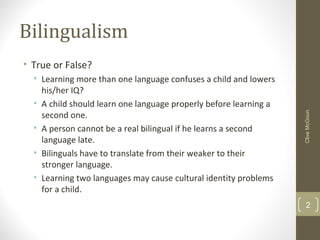

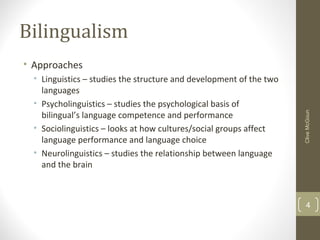

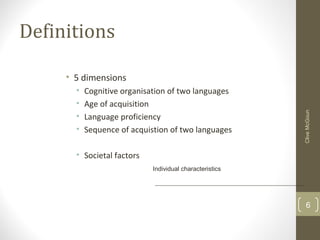







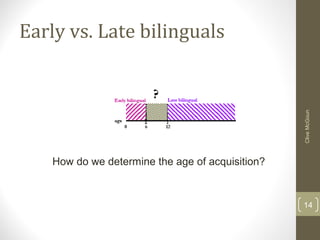



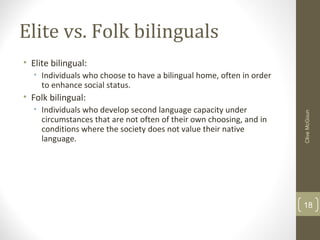







![Will learning two languages
confuse children
• Phonological mixing
• Kats – Katt (swedish) & Kass (Estonia)
• [both katt and kass mean ‘cat’ in English]
• Lexical mixing
• I want mansana
• [I want apple]
• Semantic mixing
• I lost the bus
• [lost = missed in Spanish]
• Syntactic mixing
• A house red
• [colour adjectives follow the noun in Spanish]
CliveMcGoun
26](https://image.slidesharecdn.com/languageacquisition-130906084427-/85/Language-acquisition-2-26-320.jpg)

![Unitary language system
hypothesis
• A 3-stage model for early bilingual development
proposed by Volterra & Taeschner, 1978:
• I. the bilingual child has only one lexical system comprising
words from both languages [1.6-2.1]
• II. development of two distinct lexical systems although the
child applies “the same syntactic rules to both languages”
[2.5-3.3]
• III. differentiation of two linguistic systems, lexical as well as
syntactic [2.9-311]
CliveMcGoun
28](https://image.slidesharecdn.com/languageacquisition-130906084427-/85/Language-acquisition-2-28-320.jpg)










![Reading
• Fromkin and Rodman An Introduction to Language pp 374-383
• The Bilingualism Reader London Routledge 2000 edited by Li
Wei
• Bilingualism [electronic resource] : beyond basic principles
edited by Jean-Marc Dewaele, Alex Housen, and Li Wei
Multilingual Matters, 2003
• http://www.ivanmoody.co.uk/bilingualism.htm
• http://www.literacytrust.org.uk/Research/lostop3.html
CliveMcGoun
39](https://image.slidesharecdn.com/languageacquisition-130906084427-/85/Language-acquisition-2-39-320.jpg)